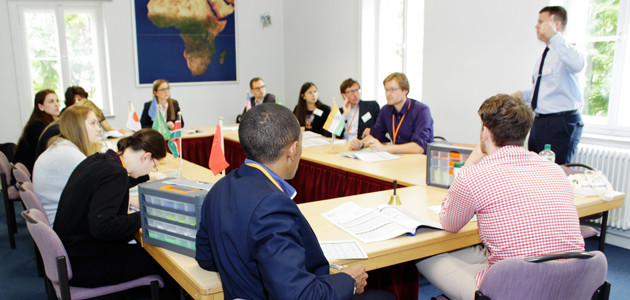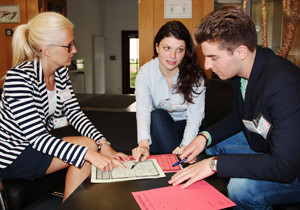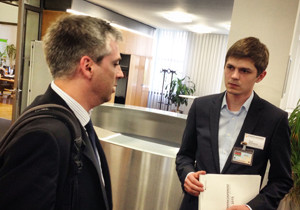 Economic summit: meeting of the “economic ministers” during the Pol&IS table top exercise. Picture: BAKS
Economic summit: meeting of the “economic ministers” during the Pol&IS table top exercise. Picture: BAKS
The best way to learn is by experience. This was the approach taken by the 76 students who attended the “summer conference” at the Federal Academy for Security Policy.
“As the prime minister of Japan, I am currently working to implement the Sustainable Japan project to improve my country’s prospects for the future,” said Matthias, while reading a document on the table in front of him. There is no time to spare. Matthias is under pressure, much like a real prime minister. For he is only performing in a large-scale simulation – a role-playing game for the domain of security policy, so to speak.
From 26 to 28 May 2015, the Federal Academy for Security Policy hosted the three-day Summer Conference – Shaping Security Policy together with the Federal Ministry of Defence for the first time. Matthias took part in the Pol&IS simulation. In the role of the Japanese prime minister, he took an active part in shaping international politics. The other participants, too, represented their interests in their functions as state and economic ministers, and also as representatives of the press and various organisations on the “international stage”.
As in the more popular Model United Nations (MUN) simulation, the United Nations were also “played” in this exercise. The participants tackled political problems from environmental pollution and Ebola through to refugee crisis and United Nations peacekeeping missions. To this end, the students developed political programmes, mandated international missions and simultaneously balanced their respective national budgets. Decisions were taken in teams and then communicated to the public.
 Japan’s Prime Minister Verena Richter holds a meeting with her defence and economic ministers before attending the UN General Assembly. Picture: BAKS
Japan’s Prime Minister Verena Richter holds a meeting with her defence and economic ministers before attending the UN General Assembly. Picture: BAKS
The students developed political programmes, mandated international missions and simultaneously balanced their respective national budgets.
The activities of all players were affected by conflicts and their resolutions, which ensured a highly dynamic simulation process over two days. However, the simulation still left enough time for debates, discussions and creative solutions. Besides conflict management, the participants were thus also able to experience the complexity of security policy at the global level.
Before the students embarked on the world of simulation, their schedule included two short presentations with subsequent discussions at the Federal Ministry of Defence. Brigadier General Carsten Breuer, who is in charge of the White Paper 2016 project group, started with an introductory presentation about the ongoing preparation of the White Paper for the Bundeswehr. The participants of the summer conference were then welcomed by Katrin Suder, State Secretary at the Federal Ministry of Defence. During a Q&A session, Dr Suder answered the students’ critical questions about current topics concerning the Bundeswehr.
The third and final day of the conference featured a hot wash-up and feedback on the simulation. The accompanying youth officers gave individual feedback, pointed out connections between decisions and their consequences and provided advice on how the students could improve their rhetorical skills.
 David Hoffmann, Economic Minister of “Africa”, in conversation with Torge Matthiesen, Afghanistan and Pakistan expert at the Federal Ministry for Economic Cooperation and Development. Picture: BAKS
David Hoffmann, Economic Minister of “Africa”, in conversation with Torge Matthiesen, Afghanistan and Pakistan expert at the Federal Ministry for Economic Cooperation and Development. Picture: BAKS
Four insiders from the Berlin “engine room” offered their perspectives on security policy.
The conference ended with a panel discussion. Four insiders from the Berlin “engine room” –the working level of politics in Germany's capital – offered their perspectives on security policy. During the subsequent discussion with the audience, Dr Julian Voje from one of the MPs' offices, Torge Matthiesen from the Federal Ministry for Economic Cooperation and Development, Lieutenant Colonel (GS) Dr Ekkehard Griep from the Federal Ministry of Defence and Dr Karl-Heinz Kamp from the Federal Academy for Security Policy answered questions on various issues of security policy.
Besides questions about arms shipments to the Peshmerga in the war with “IS” and the conflict between the parliamentary reservation – the requirement to have foreign deployments of the Bundeswehr approved by parliament – and Germany's ability to respond to foreign policy challenges, the students were also particularly interested in how Germany is dealing with cyber threats, data protection and the NSA scandal.
Author: Benedikt Böhme
